All English posts
“Thousands of minority Poles on Friday protested a new law in Lithuania that they claim discriminates against them and could diminish their education by demanding greater knowledge of the Lithuanian language.
The protests outside Parliament in the capital Vilnius underscored the contentious issue of language rights in Lithuania, a subject that has been the cause of tension in its relations with Poland.
Ethnic Poles number about 200,000 of Lithuania’s 3 million citizens, mainly the result of shifting borders after World War II. Many of these Poles speak Polish at home and attend Polish-language schools. But the law, which passed in March and took effect in July, introduces standardized Lithuanian exams for all upper-class students, which minorities believe will put them at a disadvantage vis-a-vis native speakers….
Waldemar Tomaszewski, a member of the European Parliament from Lithuania, said the government should “postpone this law until 2018 or maintain the right for students of ethnic minorities to pass exams in their native language.”
Over the past year, the language issue has led nationalist politicians in Poland and Lithuania to trade barbed criticism. Lithuania’s Polish residents are upset that they cannot spell their name in legal documents with the letter ‘w‘ _ a prominent letter in Polish that doesn’t exist in the Lithuanian alphabet…”
Full Article – Associated Press – Taiwan News
Berlin Syndrome, Joosten’s haunting debut novel.
25 Sep 2011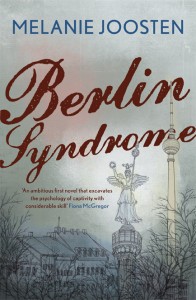 «Small-town Australia in the 1950s. I grew up knowing my parents came from a place called Poland. About Poland itself Iknew very little, ignorance that remained unchanged until I was an adult.
«Small-town Australia in the 1950s. I grew up knowing my parents came from a place called Poland. About Poland itself Iknew very little, ignorance that remained unchanged until I was an adult.
From early on, I knew Poland was ‘‘behind the Iron Curtain’’, which I actually conceived of as just that: one long curtain made of iron stretching right down from Gdansk to Trieste. (That’s a lot of curtain hooks, I know). Couldn’t get in. Couldn’t get out. Not the people; nor information about them. If I wondered at all about Poland, I came up with blanks every time. Truth is I didn’t know what I didn’t know until much later.
Yet I’ve always had a strange sense of emptiness, of a prison without walls, of a sameness and greyness, a place of silence and stillness, of unkempt cemeteries, of places overgrown, a barren landscape locked out of time.
I’ve never lost that sense, nor sought to disconfirm it. And within a few pages of starting Berlin Syndrome, it was with me again.
Melanie Joosten’s haunting debut novel is set in 2006 in the east of the once-divided German city. Pretty quickly you pick up on the ambience – the peculiar character of life in an ex-Soviet satellite.
The Russians are gone. The wall is down, sold off in thousands of fragments. But a frisson of the old Iron Curtain remains…».
Review – Ruth Wajnryb – The Sydney Morning Herald – September 24th, 2011.
Israel, a new republic of USSR.
22 Aug 2011 Life in Israel has changed after the arrival of the immigrants from the Soviet Union. They brought in high culture and entrepreneurial spirit. “For many years we joked that Israel has become the 51st U.S. state, but instead we have become one of the republics of the USSR,” says Israeli journalist Lily Galili. They “did not want to integrate, but to lead, and they changed the character of the country.”
Life in Israel has changed after the arrival of the immigrants from the Soviet Union. They brought in high culture and entrepreneurial spirit. “For many years we joked that Israel has become the 51st U.S. state, but instead we have become one of the republics of the USSR,” says Israeli journalist Lily Galili. They “did not want to integrate, but to lead, and they changed the character of the country.”
US president Bill Clinton called the Russian-speaking Israelis an obstacle to peace with the Palestinians. The Russophone party Our Home – Israel have strong influence on internal political life.
Article – Harriet Sherwood – The Guardian
Baltic energy security. EU funds from Brussels.
20 Aug 2011 “Lithuania seems to start realizing the projects leading toward energy security and reduction of dependence on one supplier (Russia). These projects (energy connections with Poland and Sweden, a planned gas pipeline between Lithuania and Poland etc.) will be realized with the EU assistance as part of the Baltic Energy Market Interconnection Plan (BEMIP).
“Lithuania seems to start realizing the projects leading toward energy security and reduction of dependence on one supplier (Russia). These projects (energy connections with Poland and Sweden, a planned gas pipeline between Lithuania and Poland etc.) will be realized with the EU assistance as part of the Baltic Energy Market Interconnection Plan (BEMIP).
This EU plan can be divided into two parts: development of the electricity sector and development of the gas sector. The latter is relevant in considering the construction of liquefied natural gas (LNG) terminals in the eastern Baltic Sea region. Lithuania, Latvia, Estonia and Finland are still isolated from the integrated EU gas supply system. According to BEMIP these states are referred to as a single segment, therefore one of the key goals is their integration into the EU gas supply system.
All three Baltic States declared their willingness to construct LNG terminals. Lithuania is determined to build a small-size terminal independently, i.e. without the EU’s financial assistance. Its capacity could be 2-3 billion cubic meters of gas per year (primarily for the internal use). The so-called Kiaules Nugara (Pig’s back) island in the Kursiu Lagoon (close to Klaipeda) has been chosen for the construction of the terminal. Lithuania has selected the US company “FluorInternational” as lead adviser for preparation and implementation of the project….more”
Article – Rimvydas Ragauskas – Geopolitika
Giuseppe D’Amato Travel to the Baltic Hansa, Greco&Greco, Milano, 2004.
During Euro 2012 Poland will issue Schengen visas to Ukrainian citizens if they have the tickets for football matches. The decision was taken after consultations between the two MFA. Joint consular offices will help citizens attending football matches abroad.
In 2010 Poland issued the 33% of all Schengen visas given to Ukrainian citizens in Ukraine and 14,487 in the first six months of 2011. Warsaw supports Ukraine’s efforts aiming at further liberalization of the visa regime with the European Union.
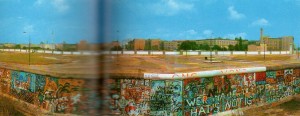
The Wall at Potsdammerplatz
“Former German Chancellor Konrad Adenauer was known not to mince his words when it came to the Soviets and their allies. He labelled the communist superpower the “deadly enemy,” called Kremlin Chief Nikita Khrushchev “a brutal fighter” and referred to East Germany as a “concentration camp.”… The catholic Adenauer had never liked protestant Prussia. As Cologne’s mayor in the 1920s, he used to close the curtains of his train compartment as soon as he crossed the Elbe river, the border to Prussia, while travelling to Berlin. He disliked what he called the “Asian steppe” on the other side of the river…
Released documents show that the chancellor was pursuing a different idea. The US should offer the Soviets a swap in secret negotiations: West Berlin for the state of Thuringia as well as parts of Saxony and Mecklenburg. He made the suggestion to Secretary of State Rusk a few days before the construction of the Wall started.
Had Adenauer got his way, the cities of Schwerin and Leipzig would have become part of Federal Republic West Germany in the 1960s rather than in 1990… Adenauer pursued the project further in the months after the Berlin Wall was built, and broached it to President John F. Kennedy…”
Article – Klaus Wiegrefe – Spiegel – Germany.
100 years since the birth of Milosz.
30 Jun 2011June 30th, 2011 marks the 100th anniversary of the birth of Nobel Prize winning poet Czeslaw Milosz. Polish President Bronislaw Komorowski has inaugurated an International Centre of Dialogue in an estate in Krasnogruda, close to the Lithuanian border. The ceremony was attended by the poet’s son, Anthony Milosz, and by representatives of Polish and Lithuanian governments. The house belonged to the family of the poet’s mother.
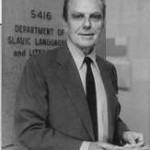
University of California
Czeslaw Milosz was born in present-day Lithuania, to partly Polish, partly Lithuanian parents, and was brought up in the multinational milieu of Vilnius. He graduated from the University of Vilnius with a degree in law. In 1951, Milosz appealed for political asylum in Paris, then in 1960, he moved from France to the United States. He taught for many years at the University of California, Berkeley. After the fall of communism, the poet returned to Poland and spent the last years of his life in Krakow, where he died in 2004, at the age of 93.
His best known work was The Captive Mind, which looked at the treatment of intellectuals under communist rule. His poetry was widely acclaimed internationally, but it was not until 1973 that his work was translated into English, allowing it to be appreciated by a wider audience.
For Lithuanian President Dalia Grybauskaite laying a memorial plaque at Vilnius University the poet’s work is a testament to Polish-Lithuanian solidarity. The most important event of the Milosz Year was the Literary Festival, which took place in Krakow from May 9th to May 15th .
Milosz’s Year – Site.
Our Polish EU Presidency.
30 Jun 2011
Logo
Polish Prime Minister Donald Tusk presented information in Parliament concerning the priorities of the Polish Presidency, which will commence on 1 July this year. The Prime Minister emphasised that during the Presidency the government wants not just to maintain but to increase Poland’s status as a responsible and highly valued state.
“It is expected that the Presidency will allow us to jointly create political leadership which does not consist of taking routine decisions but which may help the EU as a whole,” he said. “It is of paramount importance that during the Presidency we can maintain and increase Poland’s status as a country which is highly valued in internal EU debates and which demonstrates a high level of responsibility with regard to the EU’s foreign relations,” he underlined, adding that Poland will also want to maintain and increase its status as a responsible country in dealing with economic and financial issues.
The Prime Minister stressed that Poland has developed its image as a state which is capable of being a new driving force in the European Union. “Today Poland is treated as one of the leaders – of which unfortunately there are few in the EU – which strive to force through issues of EU-wide significance,” stated the Prime Minister. In his view, from the beginning of the economic crisis Poland constantly came out against the revival of state control and nationalism which was visible in the actions and statements of some politicians and EU Member States.
Mr Tusk drew attention to the fact that it is important for good political initiatives to emerge during the Polish Presidency. “We have a significant interest in Poland’s Presidency being remembered by Europeans through issues including the finalising of long-term processes,” he said. “It is possible that during the Polish Presidency we will see the completion of negotiations with Croatia, which would mean that the accession treaty will be signed during the Presidency,” stated the Prime Minister. He added that completion of negotiations with Ukraine on an association agreement and agreement on free trade is also realistic. “This would be the first successful step in the process of bringing Ukraine closer to Europe,” the Prime Minister stated.
Full article – Polish Presidency of the EU.
It will not be easy for Kiev’s Court to determine whether Ms. Yulia Tymoshenko is victim of a plot or she is really guilty. The former heroine of the pro-European Orange Revolution in November 2004 is accused of “abuse of power.” In 2009 she signed directly with her Russian colleague Mr. Vladimir Putin contracts for the supply of gas, causing around 130 million euros in damages to the national Treasury, say the investigators. The hot climate, not only for the temperature, will not help the judges. 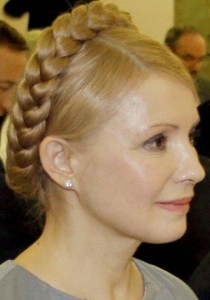
If convicted the former Ukrainian “Joan of Arc” could face up to 10 years in prison. The European Union and the United States have sent their observers. There are already numerous dossiers on members of the former government and former Interior Minister Yuri Lutsenko was arrested for “embezzlement”. Parties close to Ms. Tymoshenko accused the Russophone archenemy President Viktor Janukovich of wanting to turn himself into a dictator and former prime minister has asked the European Court of Human Rights to rule, since the charges were politically motivated. “This is just a farce,” she went down hard early in the process. This is a revenge of the “coward” Yanukovich against her.
The definition of the price of gas has always been problematic. There are many factors that contribute to shape it in a little transparency. Since the collapse of the USSR Ukrainians and Russians have been constantly on stormy relationship, going so far as to fight two “wars”. Pipelines were blocked twice in 2006 and in 2009 and Europe was left frozen in winter.
President Yanukovich assured Western capitals that justice and politics are well separated in his country. In an interview with a French newspaper the Ukrainian leader said that the price set in 2009 was “unfair.” Kiev accepted to pay $ 450 per thousand cubic meters, when at the free market it was 179. “Today – asserted Yanukovich – should be less than $ 200.”
Baltic region. New challenges, old adversaries.
20 Jun 2011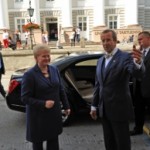 How to prevent future threats to the Baltic region was the main topic at the Estonian – Lithuanian summit, held in Tartu. The two states seek to become NATO’s energy and cyber security hubs not forgetting a recent period of tension with Russia.
How to prevent future threats to the Baltic region was the main topic at the Estonian – Lithuanian summit, held in Tartu. The two states seek to become NATO’s energy and cyber security hubs not forgetting a recent period of tension with Russia.
Estonian President Toomas Hendrik Ilves assured the support of his country in developing the energy security centre in Lithuania into a NATO Centre of Excellence, as the alliance’s cyber defence centre in Tallinn. His Lithuanian colleague Dalia Grybauskaite highlighted that both countries are united by the common goal of preventing the use of energy as a political tool. It is therefore necessary to speed up the integration of the Baltic States’ electricity market into the Nordic market (NordPool), to diversify energy supplies and to reduce dependence on a single supplier.
Mrs. Grybauskaite said that his country supported the construction of a LNG terminal in Estonia or in Latvia, but it had decided to build its own terminal in Klaipeda. She pointed out that several terminals operating in the Baltic countries would increase competition in the gas market, ensure lower consumer prices and strengthen the region’s energy independence.
“Estonia is still interested in participation in the Visaginas nuclear power station,” President Ilves assured, adding that Eesti Energia is currently considering the offers of two potential investors. “Let us hope that the negotiations for finding and involving a strategic investor will be successful and the new nuclear power station will be a project that will really enhance the energy security and independence of the region considerably.”
Speaking about cyber security, Mrs. Grybauskaite proposed to follow the recommendations of the former foreign minister of Norway, Jens Stoltenberg, and to form a Nordic-Baltic cyber defence force.
For a further European integration Mr. Ilves said that “When can we take a high-speed train from Estonia, through Latvia and Lithuania, to Berlin? When will we finally have a modern Via Baltica, which connects all of us and then runs further, to Poland? When will the Baltic states no longer be an energy isle, separated from the rest of Europe? The answers to these questions will also represent our evaluation of the health of our regional co-operation in the 21st century.”
Presidents Ilves and Grybauskaite discussed the neighbourhood policies of the European Union, with an emphasis on Ukraine, Georgia, Moldova and Belarus.
“The government in Minsk, which talks to its people in the language of batons and imprisonment, is not fit to be a part of today’s Europe. In this case, the European Union should use powerful words to provide balance, by uniting its voice with its mind; the pressure on the Belarusian regime needs to be powerful and efficient, with all sanctions very accurately aimed,” President Ilves added.
Travel to the Baltic Hansa, book by Giuseppe D’Amato.
Welcome
We are a group of long experienced European journalists and intellectuals interested in international politics and culture. We would like to exchange our opinion on new Europe and Russia.
Categories
- Breaking News (11)
- CIS (129)
- Climate (2)
- Energy&Economy (115)
- EU Eastern Dimension (85)
- Euro 2012 – Sochi 2014 – World Cup 2018, Sport (43)
- Euro-Integration (135)
- History Culture (198)
- International Policy (261)
- Military (74)
- Interviews (18)
- Italy – Italia – Suisse (47)
- Odd Enough (10)
- Poland and Baltic States (126)
- Religion (31)
- Russia (421)
- Survey (4)
- Turning points (4)
- Ukraine (176)
- Российские страницы (113)
Archives
- November 2020
- October 2020
- September 2020
- August 2020
- July 2020
- May 2020
- April 2020
- March 2020
- January 2020
- December 2019
- November 2019
- October 2019
- September 2019
- August 2019
- July 2019
- June 2019
- May 2019
- April 2019
- March 2019
- February 2019
- December 2018
- November 2018
- October 2018
- September 2018
- August 2018
- July 2018
- June 2018
- May 2018
- April 2018
- March 2018
- February 2018
- January 2018
- December 2017
- November 2017
- October 2017
- September 2017
- August 2017
- July 2017
- May 2017
- March 2017
- January 2017
- December 2016
- November 2016
- October 2016
- September 2016
- July 2016
- June 2016
- May 2016
- April 2016
- February 2016
- January 2016
- November 2015
- October 2015
- September 2015
- June 2015
- April 2015
- March 2015
- February 2015
- January 2015
- December 2014
- November 2014
- October 2014
- September 2014
- August 2014
- July 2014
- June 2014
- May 2014
- April 2014
- March 2014
- February 2014
- January 2014
- December 2013
- November 2013
- October 2013
- September 2013
- August 2013
- July 2013
- June 2013
- May 2013
- April 2013
- March 2013
- February 2013
- January 2013
- December 2012
- November 2012
- October 2012
- September 2012
- August 2012
- July 2012
- June 2012
- May 2012
- April 2012
- March 2012
- February 2012
- January 2012
- December 2011
- November 2011
- October 2011
- September 2011
- August 2011
- July 2011
- June 2011
- May 2011
- April 2011
- March 2011
- February 2011
- January 2011
- December 2010
- November 2010
- October 2010
- September 2010
- August 2010
- July 2010
- June 2010
- May 2010
- April 2010
- March 2010
- February 2010
- January 2010
- December 2009
- November 2009
- October 2009
- September 2009
- August 2009
Our books




